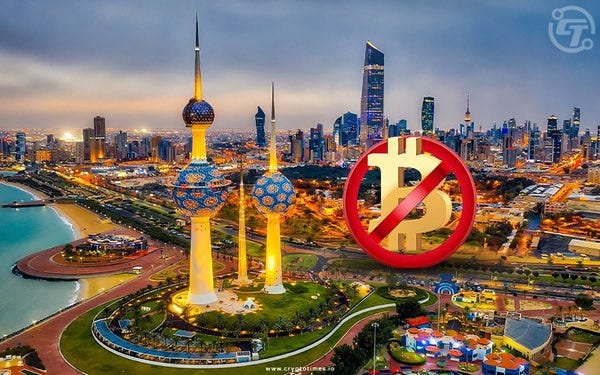Kuwait's Ban on Bitcoin
A Missed Opportunity for the Future
In a surprising turn of events, the country of Kuwait has recently taken a hard stance against Bitcoin, banning its use, transactions, mining, and investments. This decision has the potential to significantly impact both the country and its citizens, as it restricts them from participating in the growing digital economy and obtaining what could potentially be the next world reserve currency.
Bitcoin, the pioneering cryptocurrency, has been making waves across the global financial landscape for over a decade. Its decentralized nature, scarcity, and increasing adoption have led many to believe that it could one day become a significant alternative to traditional fiat currencies. However, Kuwait's ban on Bitcoin places the country in a disadvantageous position, isolating it from the ongoing financial revolution and denying its citizens access to potential financial gains.
One of the major repercussions of this ban is the exclusion of Kuwait from participating in the burgeoning digital economy. As the world embraces the digital age, cryptocurrencies like Bitcoin offer the potential to revolutionize financial services, international trade, and cross-border transactions. By blocking Bitcoin, Kuwait risks missing out on the advantages of adopting blockchain technology and may find it challenging to keep pace with countries that embrace financial innovation.
Moreover, by banning Bitcoin, Kuwait denies its citizens the opportunity to diversify their investment portfolios. In an era of geopolitical uncertainties and economic volatility, cryptocurrencies like Bitcoin have increasingly been considered a hedge against traditional financial assets. Denying access to such potential investments could limit Kuwaiti citizens' ability to protect their wealth and capitalize on emerging opportunities.
Furthermore, the ban prevents Kuwait from positioning itself as a global financial hub for the digital economy. By shunning cryptocurrency-related activities, the country may miss the chance to attract blockchain startups, cryptocurrency exchanges, and other innovative companies. These entities could potentially contribute to job creation, foster economic growth, and enhance Kuwait's reputation on the world stage.
It is essential to note that countries such as El Salvador and Panama have taken the opposite approach, embracing Bitcoin and other cryptocurrencies as legal tender. By doing so, they have positioned themselves as early adopters, attracting attention from investors and businesses looking to explore cryptocurrency-friendly jurisdictions. This strategic move gives them a competitive advantage and opens up new avenues for growth.
Despite the current ban, history has shown that the regulation of cryptocurrencies can be a dynamic process. Many countries initially adopted strict stances but later retracted or revised their policies to adapt to changing global financial trends. In light of the potential future growth of cryptocurrencies, it is plausible that Kuwait might eventually reevaluate its stance on Bitcoin and other digital assets.
When that time comes, it is likely that the price of Bitcoin would have surged substantially. As the world becomes more digitally connected and the demand for cryptocurrencies increases, the scarcity of Bitcoin's limited supply will likely drive its value higher. If Kuwait were to lift the ban in the future, it may find itself having to buy Bitcoin at significantly higher prices, thus missing the opportunity to accumulate the asset when it was more accessible and affordable.
In conclusion, Kuwait's ban on Bitcoin reflects a missed opportunity for the country and its citizens to participate in the global financial revolution. By blocking its citizens from obtaining the potential next world reserve currency and denying them access to the digital economy, Kuwait risks falling behind in the rapidly evolving financial landscape. While the future remains uncertain, it is possible that the country may reconsider its stance in the coming years, at the cost of acquiring Bitcoin at a significantly higher price.


